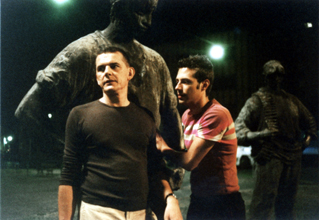The Wind, in the Evening
Andrea Adriatico
Italien 2004

|
" Delphi 06.02. 21.45 |
Produktion + Weltvertrieb: Teatri di Vita
Via Emilia Ponente 485, 40132 Bologna
Tel. & Fax: (39-051) 61 99 900
E-mail: cinema@teatridivita.it
Buch: Stefano Casi, Andrea Adriatico
Kamera: Gigi Martinucci
Darsteller: Corso Salani, Francesca Mazza,
Sergio Romano, Fabio Valletta,
Francesca Ballico
Format: 35mm (von digital), 1:1.85, Farbe
Länge: 92 Minuten, 24 Bilder/Sek.
Sprache: Italienisch
The railway station of a big Italian town. Nightfall. Some people are sending some mysterious SMS from their mobile phones. Marco takes his bicycle and slowly cycles home. In the meanwhile, Paolo is at home waiting for his boyfriend Luca to arrive for dinner. Marco gets home, but as soon as he opens the door, two shots kill him. Luca accidently gets in the killer’s way. The killer shoots him and he falls, seriously wounded. People run into the street. Among them is Paolo, who’s completely upset, and his neighbour Francesca. She takes Paolo to the hospital where he argues with a doctor who can’t tell him anything about Luca because Paolo isn’t a ‘real’ relative. Paolo learns accidentally from a journalist that Marco was an important politician in the government and Luca has just died... An atrocious political crime is the starting point of a reflection upon human implications of a sudden death: an unintentional and unexpected desertion. We are weakly hanging by the thread of life just like leaves that ”a little breath of wind could sweep away” (B.M. Koltès). From the protagonist’s point of view, the wind sweeping away his love and upsetting his life coincides exactly with an act of violence that strongly affects the social and political life of the entire country. The hugeness of a terrorist attack (emphasised not just by a tragic murder, but also by a climax of tension in a nocturnal town continually disrupted by police sirens) redoubles and reverberates in a common man’s heart; a man who loses the person with whom he shared his life. For a night, the focus of attention moves from a famous man’s death to a common man’s death that will soon be forgotten.
Andrea Adriatico, geb. 1966 in L‘Aquila. Seit 1989 als Theaterregisseur tätig. 1993 Gründung des ‘Teatri di Vita’, ein internationales Zentrum für darstellende Kunst in Bologna. Nach drei Kurzfilmen ist Il vento, di sera sein erster abendfüllender Film.